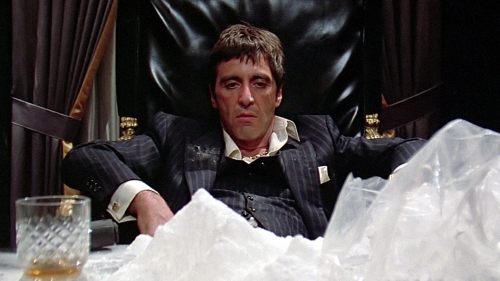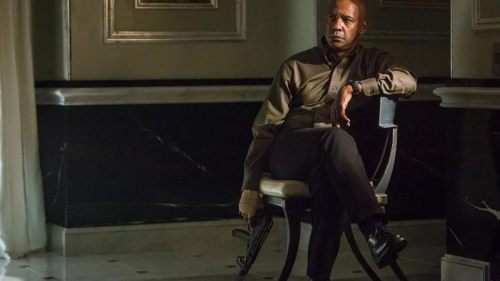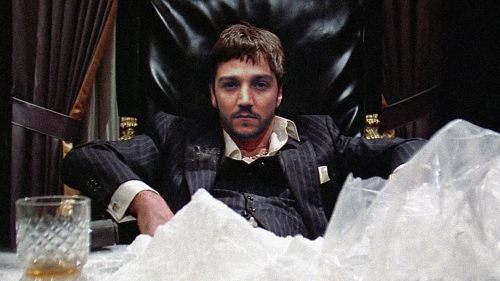Real Gangster: Five Films Based On Real Life Mobsters
Scott Cooper’s Black Mass hits theaters this month, following the exploits of infamous Massachusetts mobster Whitey Bulger, who led an empire of organized crime for two decades in New England before spending two more decades on the lam. Bulger was captured in June 2011, extradited at the age of 81 and eventually convicted of 31 counts of racketeering, money laundering, extortion and murder.
Here are five more movies that focus on the gangsters of history rather than fiction.
SCARFACE, dir. Howard Hawks and Richard Rosson, 1932
It’s hard to watch Howard Hawks’ Scarface without being constantly reminded of the remake brought into the world by Brian De Palma half a century later. Although the setting and characters have changed, it’s still the same story of an immigrant tough guy rising to power by annihilating his enemies in the criminal underworld. More specifically, it’s the story of Al Capone, slightly amended for dramatic purposes.
Paul Muni is Tony Camonte, much closer than Tony Montana to his real-life inspiration Capone, who supposedly owned his own print of the film. An Italian immigrant in Chicago, Camonte is a full-blown asshole: mean, caustic, slimy and unpleasant. He’s also terrifically watchable as a villain-protagonist -- Muni’s charisma is every bit as strong as Pacino’s, if less overtly theatrical.
Set at the height of the Prohibition gang wars, the 1932 film would have barely even been a period piece in its own time, as the liquor ban wasn’t even repealed until the following year. Scarface saw a lot of criticism from people claiming it glorified still-current crimes. Likely in response, the film opens with a somber title card insisting it’s an indictment of gangsterdom and a nudge at the government to destroy it. It wasn’t enough, though: the Hays production code was ushered into Hollywood soon after its release, changing the tone of crime films for decades. (Andrew Todd)
THE VALACHI PAPERS, dir. Terence Young, 1972
Producer Dino De Laurentiis made something of a habit out of chasing after huge box office hits, mimicking their subject matter and trying, with varying results, to replicate their success. When Star Wars was a smash, De Laurentiis countered with Flash Gordon and, when that didn’t work, with Dune (which also didn’t work). When Jaws set the world on fire, DeLaurentiis responded with ORCA and, for some reason, a remake of King Kong. And when The Godfather became a massive box office hit, De Laurentiis reasoned its success was partly because it was based on the best-selling novel by Mario Puzo. So in 1972 the Italian impresario adapted a popular mafia book of his own: The Valachi Papers by Peter Maas.
De Laurentiis’ film, directed by Terence Young, told the true story of Joseph Valachi (Charles Bronson), a lifelong mobster who turned informant in 1963, making “Cosa Nostra” a household phrase and exposing the heretofore secret world of the mafia to the outside world for the first time. Valachi’s testimony was a turning point -- some say a tipping point -- in the history of the Italian mafia in America, and much of Hollywood’s mob-related content can be traced to Valachi throwing open the curtains on that thing of theirs. As a film, The Valachi Papers is a curious anachronism: it looks a good ten years older than its 1972 release date, with a low-budget, poliziotteschi vibe to the proceedings that could never hope to compete with the New Hollywood polish of The Godfather. But it’s also one of the last times Charles Bronson got to play anything other than Charles Bronson, as he portrays the conflicted Valachi across four decades in a kind of prototypical Goodfellas arc. Two years later, Bronson would be gunning down punks in the New York subway, setting his screen image in stone, and setting himself on a late-career path of superstardom. (Phil Nobile Jr.)
DILLINGER, dir. John Milius, 1973
The ‘70s were basted in an existential malaise, pre-apocalyptic diminishing returns from the optimism of Counter Culture. The American New Wave was the greasy breakfast soaking up the hangover of the ‘60s. The Hippies had lost, replaced with disenfranchised outlaws soon to birth Punk. Dillinger is a film about a scene with not much difference between when it was made, 1973, and when it takes place, 1933. John Milius, smoking his cigar and cleaning his gun, made his directorial debut, starring the era’s most unique and honest actor, Warren Oates. From the opening credits, “We’re in the Money” playing over F.S.A. photographs of the poor, displaced and dusty, Dillinger is a heavy-handed, bitter cocktail of cynicism, nihilism and abruptness. John and his gang, a real life supergroup of criminals played by a dream-team of ‘70s character actors, roam the country as journeymen, slowing only to commit the kind of stunts that make you wonder how many folks lost an eye during production. As with all great ultra-violence, the broken glass, stair-falls and bullet-riddled bodies aren’t a sign of death, but a reminder of being alive. The 15-minute gunfight isn’t the film’s denouement, it’s the transition into the last act, rife with sympathy and the satisfying moment where we can’t tell the G-Men from the hoods. As Milius transitions between pseudo-documentary, voice-over and fervent camerawork, Oates sporadically and spontaneously looks in the camera, proclaiming platitudes like “I may not live forever but I’d be a damned fool not to try.” The Great Depression and the 1970s were both about The System falling apart, and neither John Dillinger nor the New Wave survived. The convenience of his assassination outside a movie theatre simply marquees the undeniable fact that they existed, forces that traversed forty years to prove their profundity. (Noah Segan)
THE UNTOUCHABLES, Brian De Palma, 1987
First off, regardless of what year it is, how are you not going to watch a movie starring Kevin Costner, Sean Connery and Robert De Niro? One that was directed by Brian De Palma and written by David Mamet? With music by Ennio Morricone? This movie is a slam dunk before you even see it. And then you see it. The slam dunk turns into a grand slam.
The Untouchables is based on the true story of how Elliot Ness and his crew of un-bribable Prohibition Agents (one of them played by Sean Connery in an Oscar-winning role) finally took down Al Capone. How historically accurate is it? Probably not very. Did Al Capone really bash in a crony’s head with a baseball bat in the middle of a business meeting? I dunno. But he sure does here! Did a baby carriage really roll down the steps of Chicago’s Union Station during a slow-mo shootout that apes Eisenstein’s Battleship Potemkin? Sure! I believe it. Did figures like Elliot Ness and Al Capone even exist in real life? I don’t know. Ask my history teacher. She actually saw the film ten times. That lady had a thing for Kevin Costner that would not quit. (Evan Saathoff)
DONNIE BRASCO, dir. Mike Newell, 1997
Here's the thing about Donnie Brasco: it's a movie about a gangster who wasn't really a gangster. The real Donnie Brasco, Joe Pistone, was an FBI agent assigned to break up a series of truck hijackings plaguing New York in the late ‘70s. Joe's Sicilian heritage and ability to drive 18-wheelers and bulldozers made him a perfect candidate for the job, which was originally intended as a six-month undercover jaunt into the city's criminal underbelly. Those six months quickly turned into six years, a period in which Piston -- now operating under the name Donnie Brasco -- revolutionized the idea of "undercover work" and more or less became one of the gangsters he'd originally set out to capture.
In the film, Donnie's played by Johnny Depp, and it's a knockout performance. But the real star of the film is Al Pacino, who takes on the role of real-life gangster Benjamin "Lefty" Ruggiero. As played by Pacino, Lefty is an incredible creation: a dangerous, sleazy mob guy...who's also a bit of a sad sack. Whereas many mafia movies prefer to chart the rise of a low-level hood to mob boss (or an already-established mob boss's fall from grace), Donnie Brasco's Lefty Ruggiero is a made man who never really attained the flash and respect afforded to some of his peers. He's just a little too dumb for his own good. It's an endearing, beautiful showcase for Pacino. Depp's great as Donnie, but Pacino's the heart and soul of the movie.
Depp returns to the gangster genre in this month's Black Mass, where he'll be playing Whitey Bulger, a no-shit, honest-to-God gangster if there ever was one. (Scott Wampler)
This was originally published in the September issue of Birth.Movies.Death. magazine. See Black Mass at the Alamo Drafthouse this month.



